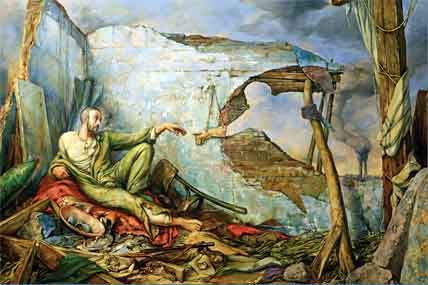 It’s beautiful to the eye, thought-provoking to the mind, and painful to the heart.
It’s beautiful to the eye, thought-provoking to the mind, and painful to the heart.
It’s the work of Samuel Bak.
Today at Wabash College, a display of Bak’s world-renowned paintings opens for a five-week run in the Eric Dean Gallery of the Fine Arts Center. The exhibit is titled, "The Art of the Question: Recent Paintings by Samuel Bak."
This evening from 5 p.m. to 7 p.m., a reception will be held to open the exhibit at the Eric Dean Gallery, along with a 45-minute presentation by Bak that begins at 6 p.m. in the Ball Theater.
Wabash’s very special presentation has been made possible because of Bak’s relationship with Gary Phillips, the Dean of the College. Phillips coauthored a book on Bak’s work with Danna Fewell and Yvonne Sherwood, "Representing the Irreparable: The Shoah, the Bible, and the Art of Samuel Bak."
Bak, who now lives in Weston, Mass., is a Holocaust survivor who escaped death with 200 other residents — including his mother—of the Vilna, Poland ghetto in 1945. Bak’s father was among the thousands of Vilna casualties.
His exposure to the pain and madness of one of the world’s most trying periods has been transferred to canvas in his oil artwork.
Those who take advantage of this wonderful opportunity to view Bak’s art will find his work both troubling and beautiful. Vivid colors "invite" a person to take a closer look, but the stories on the canvas tell the story of a world ripped apart, and then patched back together. The paintings are both visually stunning, and yet dark
Some of the themes hit the viewer like a locomotive, while others are subtle, buried beneath layers within each painting.
Phillips has been amazed by the power that flows from Bak’s work.
"He interrupts the way you see things, and the way you think about things," Phillips said. Bak’s work interrupted Phillips in 1998. His colleague, Fewell, was teaching religion at SMU that year when one of her students brought her some examples of Bak’s art. The student suggested that Bak was searching for answers to some of the same questions being asked in the religion class.
Fewell and Phillips, who was teaching religion at the University of the South at the time, agreed.
"We were asking questions like ‘Why am I here?’ ‘Why do good people suffer?’ ‘Why does evil triumph?’" Phillips said.
Wanting to know more, Fewell and Phillips visited Boston’s Pucker Gallery in 2000.
"Bernie Pucker gave us a half day in 2000," Phillips said. "And on our next trip several months later, he arranged for us to meet Bak." Fewell and Phillips were so intrigued with the artist, they decided to collaborate on a book exploring Bak’s art and world and how it related to religion. The collaboration led to a friendship that eventually paved the way for Bak’s art to be exhibited at Wabash.
Phillips was asked what he enjoyed about researching Bak’s work. "You discover a world you haven’t been a part of," Phillips said, a twinkle in his eyes. "That’s the fun. To discover something you haven’t known."
Likewise, Phillips invites members of the community to take advantage of this special opportunity. "Come see a human being who has lived through experiences that we can’t imagine," Phillips said. "It’s an opportunity to meet someone so clear in what he says and thinks.
"He is a terrific speaker. He loves to talk and he has things to say. He does talk about himself, but he brings you into the conversation, and by the end, you will have something to say to him. These are amazing things to reflect upon. Deep, dark and hard things. He does it with fantastic shapes and colors. You will be amazed by his creativity. Where does it come from? Is there logic to it?"
The Eric Dean Gallery is located on the south end of the Fine Arts Center. Gallery hours are Monday through Friday from 9 a.m. until 5 p.m. and Saturday from 10 a.m. to 2 p.m. The gallery is free and open to the public.